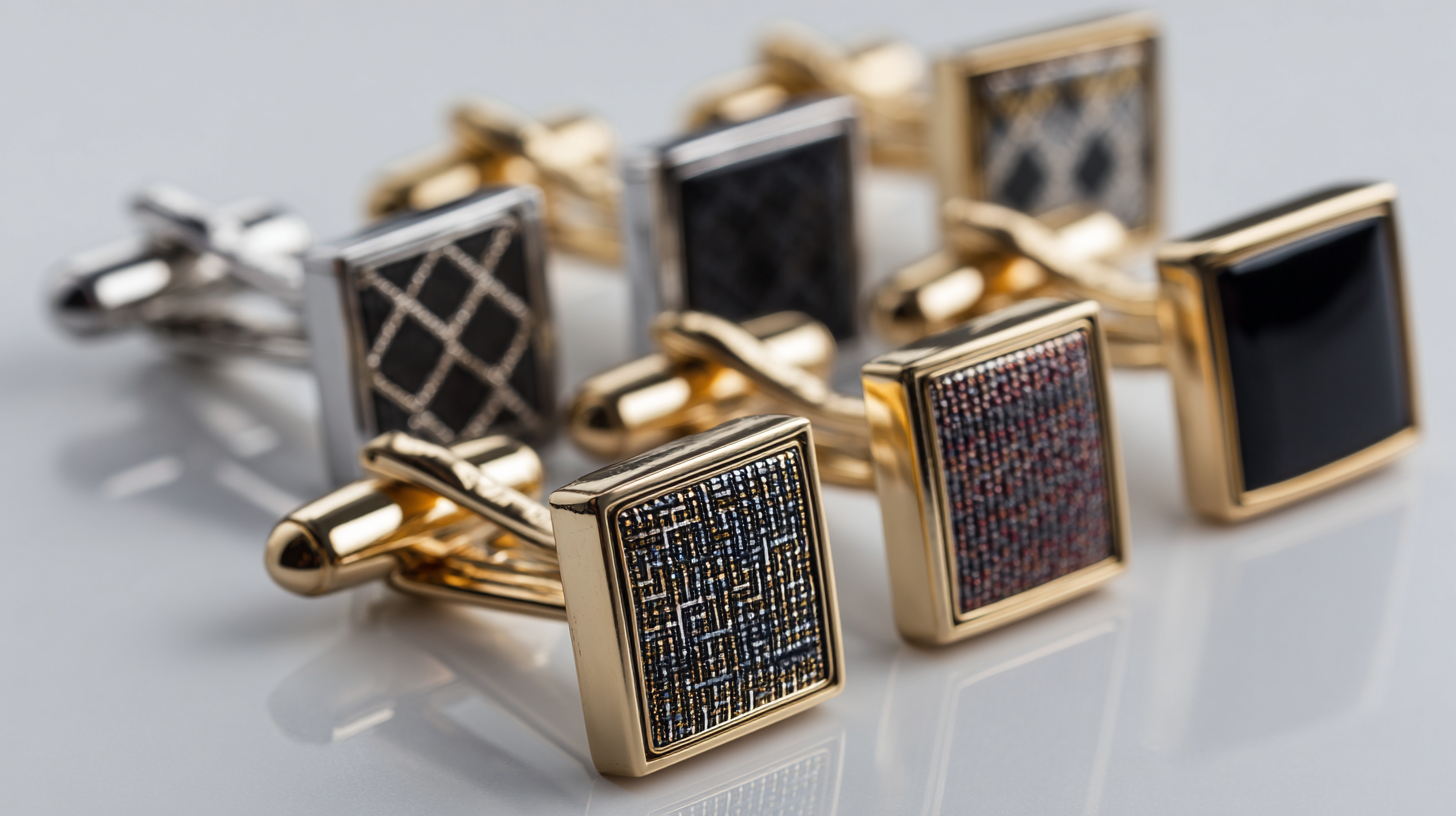Leave Your Message
When it comes to elevating a gentleman's wardrobe, few accessories make a statement quite like a stylish cufflink set. The right cufflink set not only enhances formal attire but also serves as a reflection of personal style and taste. As the phrase "World-class manufacturing, Chinese pride, exported globally" suggests, choosing the best cufflink set is not just about aesthetics; it’s about the quality and craftsmanship behind the product. This ultimate checklist is designed to guide you through the essential factors to consider when sourcing cufflink sets that align with your business needs, ensuring that you invest in products that resonate with your brand’s identity while catering to a discerning clientele. Whether you're a retailer looking to stock your shelves or a business wanting to make a lasting impression, understanding the intricacies of selecting the perfect cufflink set is crucial for your success.

When sourcing cufflink sets for your business, the two primary factors to consider are the materials used and the craftsmanship involved in their creation. The choice of material is crucial since it directly affects both the durability and aesthetic appeal of the cufflinks. High-quality metals like stainless steel, sterling silver, or gold plating not only enhance the design but also ensure longevity. Moreover, the inclusion of unique materials such as enamel or gemstones can set a cufflink apart, appealing to customers looking for something distinctive.
 Craftsmanship is equally essential when evaluating cufflink sets. A well-crafted cufflink often showcases meticulous attention to detail, which can elevate its perceived value. Look for features like precise finishing, secure fastening mechanisms, and overall alignment, as these indicate a higher standard of manufacturing. A reputable manufacturer will take pride in their workmanship, resulting in cufflinks that not only look stunning but also function flawlessly. By focusing on these aspects of material and craftsmanship, you can select cufflink sets that will effectively represent your brand’s commitment to quality.
Craftsmanship is equally essential when evaluating cufflink sets. A well-crafted cufflink often showcases meticulous attention to detail, which can elevate its perceived value. Look for features like precise finishing, secure fastening mechanisms, and overall alignment, as these indicate a higher standard of manufacturing. A reputable manufacturer will take pride in their workmanship, resulting in cufflinks that not only look stunning but also function flawlessly. By focusing on these aspects of material and craftsmanship, you can select cufflink sets that will effectively represent your brand’s commitment to quality.
As the accessories market continues to evolve, understanding consumer preferences is crucial for sourcing the best cufflink sets for your business. Recent market trends indicate a growing demand for unique designs that reflect individual style, moving away from traditional, plain options. Today's consumers are looking for cufflinks that not only serve a functional purpose but also express their personality and enhance their overall attire. The rise of social media has played a significant role in this shift, as influencers showcase diverse styles, allowing consumers to discover bold patterns and artisanal craftsmanship.

Moreover, sustainability is becoming a key consideration for many shoppers. Eco-conscious consumers are increasingly opting for cufflink sets made from sustainable materials or those that support ethical production practices. Offering a selection that includes environmentally friendly options can appeal to this demographic and position your brand favorably in a competitive market. By staying attuned to these shifts in consumer preferences, businesses can better align their product offerings and marketing strategies, ensuring that their cufflink sets resonate with today's discerning buyers.
When sourcing cufflink sets for your business, evaluating cost-effectiveness is crucial. The balance between price and quality can significantly impact both customer satisfaction and your bottom line. Recent studies highlight that in various sectors, including healthcare, achieving cost-effectiveness often requires substantial price reductions. For instance, data indicates that certain products need discounts of up to 85% to meet accepted cost-effectiveness thresholds. This principle can be applied to cufflinks; the best suppliers will offer high-quality products at competitive prices.
Moreover, the importance of transparency in pricing cannot be understated. The healthcare sector is currently grappling with approximately $935 billion in waste, primarily due to poor pricing strategies that lead to inflated costs. For cufflink sourcing, ensuring that you choose suppliers who provide clear and fair pricing models can mitigate risks and enhance your purchasing strategy. Engaging with companies that utilize data-driven pricing methodologies can help you ensure that your sourcing not only meets your quality expectations but also adheres to a budget-friendly framework that maximizes your investment.
When it comes to sourcing cufflinks in bulk, a strategic approach is essential to ensure quality and cost-effectiveness. Begin by identifying suppliers that specialize in cufflink manufacturing. This can be done through online research, trade shows, or industry networking. Establishing a relationship with reliable suppliers not only facilitates communication but also allows for negotiation on price and terms. Remember to consider suppliers who offer customization options, as personalized cufflinks can significantly enhance your brand's appeal.
Another critical aspect of effective bulk sourcing is to request samples before placing a larger order. This will enable you to assess the quality and craftsmanship of the cufflinks directly. Pay attention to details such as material, finish, and durability, as these factors can influence your customers' satisfaction and repeat business. Additionally, developing a clear understanding of your target market’s preferences will guide your selection process, ensuring that the cufflinks you choose align with customer expectations. By applying these best practices, you can confidently navigate the bulk purchasing process and secure the best cufflink sets for your business needs.
When sourcing cufflink sets for your business, evaluating supplier reliability is crucial for establishing successful partnerships in the fashion accessories industry. According to a report from Statista, the global fashion accessories market size was valued at approximately $324 billion in 2022 and is projected to grow by 5.5% annually over the next five years. This rapid growth underscores the importance of aligning with reliable suppliers who can consistently meet demand and maintain quality standards.
Key metrics for assessing supplier reliability include on-time delivery rates, product quality, and responsiveness. A McKinsey & Company survey revealed that 70% of companies that prioritized supplier management reported improved performance and stronger relationships. Additionally, evaluating a supplier's past performance through reviews and case studies can provide insight into their reliability. By focusing on these metrics, businesses can cultivate partnerships that not only enhance their product offerings but also foster long-term success in a competitive market.
